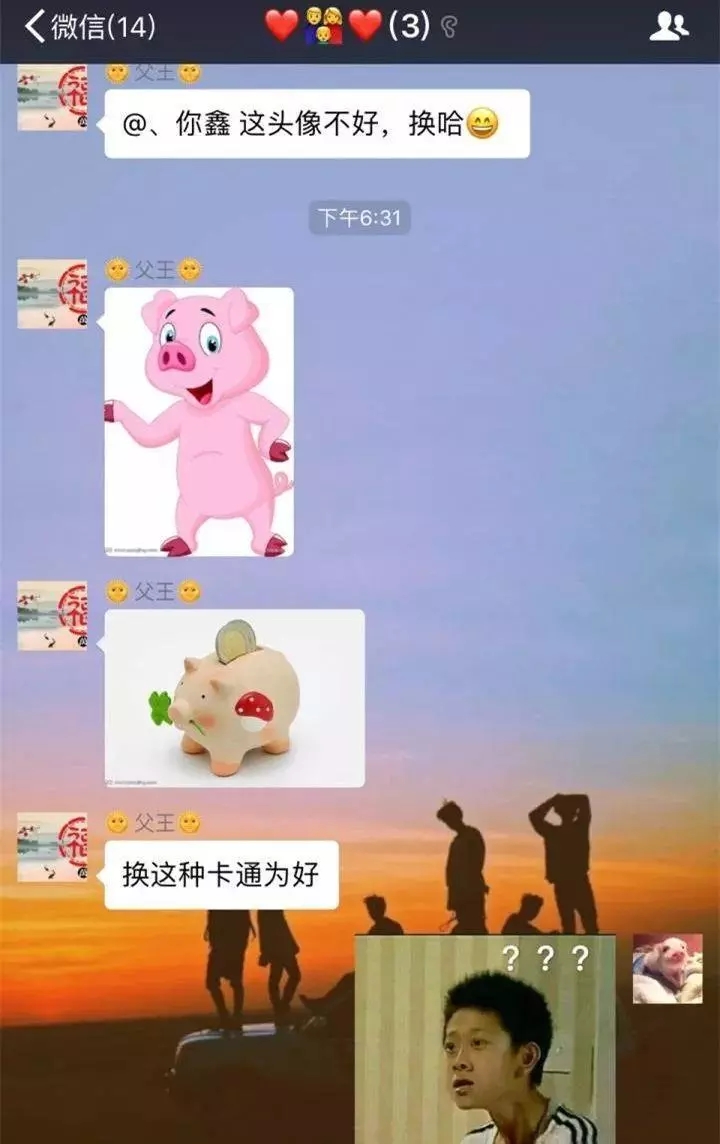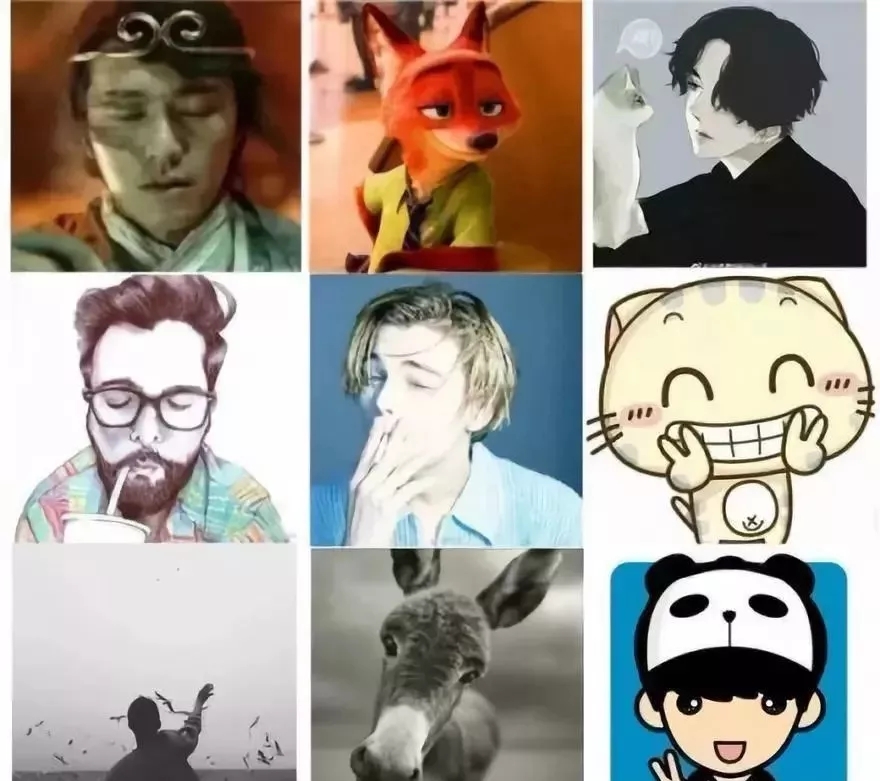在社交軟件重度使用的今天,我們驚嘆于社交媒體所迸發(fā)的巨大能量。
而你有沒有注意到頭像的內(nèi)在潛力呢?頭像會(huì)在很大程度上影響聊天時(shí)的第一印象。
Believe it or not, profile pictures can tell a lot about the person. Is he or she funny? Single or married? Plump or slim? Strangers can more or less get a clue of what kind of person you are from your avatar!
這年頭,看了一個(gè)人的頭像,對(duì)他的了解也就八九不離十了。你是不是一個(gè)幽默的人?單身還是已婚?胖還是瘦?陌生人都能或多或少從你的頭像中取得一些線索。
avatar /??v?tɑ?/:頭像;神的化身
Frankly speaking, profile picture is to social media what one's appearance is to real life.
坦白來說,一個(gè)人的頭像在網(wǎng)絡(luò)社交中的地位,就像是外表在現(xiàn)實(shí)生活中的作用一樣,很大程度上影響了你給人的印象。
Since your profile picture serve as the handiest source of what kind of person you are to strangers or people unfamiliar, it can leave a strong influence on how others think of you in the long term.
在剛剛添加一個(gè)人的微信或者其它社交賬號(hào)的時(shí)候,頭像也許是對(duì)方能看到的關(guān)于你的為數(shù)不多甚至唯一的內(nèi)容,因此也就自然而然成為了對(duì)方對(duì)你印象的主要信息來源。
handy: 有用的;手邊的;便利的
For example, a lonely silhouette makes others feel distant while a warm smile brings sincerity.
一個(gè)高冷孤寂的背影也許就會(huì)在聊天中增加距離感,而自己笑容滿面的照片也許會(huì)在不覺間給別人帶來親切感。

Furthermore, profile photo can partially decide how others trust you.
進(jìn)一步而言,頭像還會(huì)很大程度上影響對(duì)方對(duì)你的信任程度。
Reports show that a photo of real person gains trust more easily than an image of a cartoon or something else.
研究表明使用真人照片做頭像要比使用虛擬頭像更容易取得他人的信任。

Sometimes profile pictures can mirror one's inner feelings. People who adopt cute pets and animation figures as their profile pictures are more likely to feel uneasy when handling daily trivia.
有時(shí),頭像能一定程度反射人的內(nèi)心世界。研究發(fā)現(xiàn),內(nèi)心有不安感的人更喜歡使用動(dòng)物和卡通等虛擬頭像。
Meanwhile, your profile picture is revealing your age without you noticing it.
與此同時(shí),頭像會(huì)在不經(jīng)意間暴露一個(gè)人的年齡。
Youngsters tease elder people about their old-fashioned profile photos — either landscape or plants.
年輕人取笑老一輩人的頭像過時(shí),不是風(fēng)景就是植物。
Obvious enough, post 90s people have more complex taste in choosing profile photos — some use portraits of their idols, some use internet memes while others choose a popular dog to show they are single. Some even follow the pace of season to change their profile photos.
顯然,90后的頭像是五花八門,難以將其歸類。有人用偶像的照片;有人用各種奇葩的表情包;也有人用一個(gè)狗頭做頭像,無聲地表明自己的情感狀況,更有甚者隨季節(jié)更換頭像。

▲ 長輩們常用的頭像

▲ 90后五花八門的頭像

▲ 隨季節(jié)更換的頭像
Unavoidably, different tastes in profile photos render awkward dispute between children and parents.
在頭像選擇上的巨大審美差異難以避免地挑起了孩子同父母之間許多啼笑皆非的爭吵。
A netizen complained that her mom asked her to change the avatar in which she made a face and stuck out her tongue because Chinese traditional grim reapers do the same facial expression.
一位網(wǎng)友就曾抱怨到她的媽媽勒令她換掉自己的頭像——那是一張她自己吐著舌頭的自拍。媽媽的原因竟是中國文化中勾人魂魄的白無常也吐著舌頭。

↓↓↓父上:屬鼠的別用貓做頭像。

↓↓↓我用這個(gè)當(dāng)頭像,我媽覺得我蠢,不讓我用貓當(dāng)頭像,說有邪氣 ——@長弓鐵白

求貓的心理陰影面積

CD君在此特別奉上媽媽眼中的模范頭像:

Profile picture is believed to somehow reflect personality.
關(guān)于頭像與性格的關(guān)系,坊間一度流傳很多神奇的說法。
A vote on the profile photos mostly used by playboys went viral on Sina Weibo in January 2018. Many internet users gave positive backing to the result of the vote.
2018年1月,新浪微博網(wǎng)絡(luò)票選出了九大“渣男”微信常用頭像,登上了熱搜排行榜。很多人表示,評(píng)選結(jié)果“很準(zhǔn)”。

▲ 微博網(wǎng)絡(luò)票選出的九大“渣男”最常用微信頭像
Those who use selfies as profile pictures are more inclined to express themselves in public. To be more specific, they are eager to build a positive self-image and reveal it to others. Though people of similar temper are very likely to appreciate similar style of profile photo, it is still closely relevant to individual preference.
用自己照片做頭像的人,更傾向于公開表達(dá)自己。也就是說,他們更希望展現(xiàn)自己想塑造的積極的個(gè)人形象。雖然秉性相近的人會(huì)欣賞同類型的頭像照片,但還是能體現(xiàn)出個(gè)體差異。
Is there anyone in your friend list who changes profile photos so frequently on social media that you can't follow its pace? You have an eyeful of it and can't help wondering: why did he/she change his/her avatar again?
你是不是跟不上某個(gè)朋友更換頭像照片的速度?你不禁感慨:他/她怎么又換頭像了?
Frequent change of profile photos, or even a changeable style, is likely to be a sign of instable personality. Of course, changing profile photos frequently in a short term may indicate that your friend feels up and down during that time.
頻繁更換頭像,甚至風(fēng)格多變,很可能是一種性格不穩(wěn)定的表現(xiàn)。當(dāng)然,短期內(nèi)經(jīng)常換頭像,也許表明頭像主人在某段時(shí)間情緒不太穩(wěn)定。
However, one exception is that some perfectionists change their profile pictures from time to time to approach the so-called "perfect" standard.
不過,頻繁換頭像可能代表了人格中的完美主義。對(duì)于這一類人來說,找到一個(gè)讓他們完全滿意的頭像,真的太難了。
Just as appearances do not determine everything, avatars may have a greater impact on the formation of first impressions, but this effect fades as people learn more about each other. So please do not overstate the importance of a photo online.
不過,就像外貌并不能決定一切一樣,頭像對(duì)第一印象的形成或許有較大的影響,但在人與人逐漸熟悉的過程中,這種影響卻會(huì)逐漸消退,所以不要夸大頭像的作用。
In fact, people know from the bottom of their hearts that a profile photo can never alter the true image of a person that is mostly based on character and quality.
其實(shí)人們心底都明白——真正的感情,建立在性格和品質(zhì)等基礎(chǔ)上,不會(huì)被一個(gè)頭像所換來,也不會(huì)因一個(gè)頭像而失去。
(來源:中國日?qǐng)?bào)雙語新聞編輯部)
